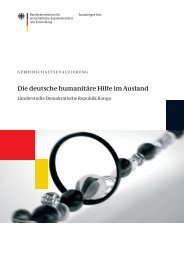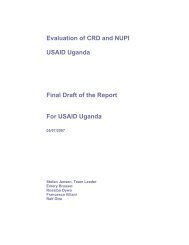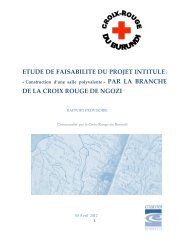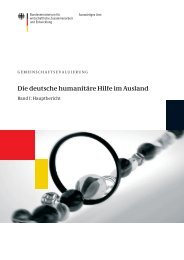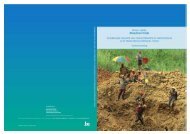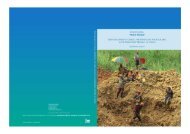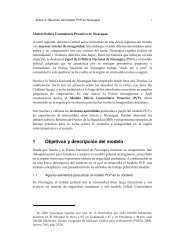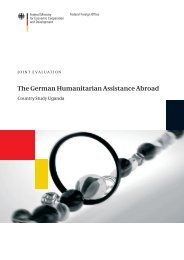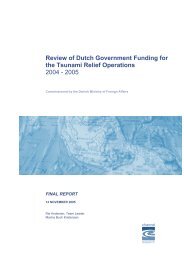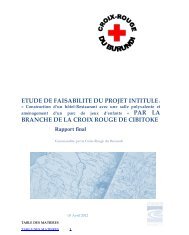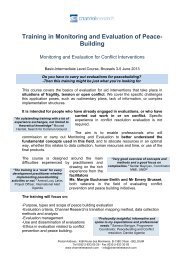A ripple in development? - Channel Research
A ripple in development? - Channel Research
A ripple in development? - Channel Research
You also want an ePaper? Increase the reach of your titles
YUMPU automatically turns print PDFs into web optimized ePapers that Google loves.
moved. Capacity <strong>in</strong> this sense <strong>in</strong>cludes not only the <strong>in</strong>dividual level, but<br />
also that of the organisation, and the govern<strong>in</strong>g or “enabl<strong>in</strong>g” environment<br />
83 .<br />
The review <strong>in</strong>cludes analysis of capacity build<strong>in</strong>g efforts, with a<br />
particular attention to disaster risk reduction as a case study: one IFRC<br />
member (Indonesian Red Cross), one UN agency programme (CADREP<br />
of UNDP, Sri Lanka), and one NGO (Care Society, Maldives). Selection<br />
was made by the evaluation team and discussed with the stakeholders<br />
<strong>in</strong> the Jakarta workshop.<br />
These programmes were chosen to represent a range (<strong>in</strong> terms of<br />
size and <strong>in</strong>ternational organisation type) of stakeholders and approaches<br />
<strong>in</strong> disaster risk reduction, where l<strong>in</strong>kages are particularly important. As<br />
there are limits <strong>in</strong> terms of comparison as the organisations have different<br />
mandates, expertise, history, documentation, disaster experience,<br />
and operate <strong>in</strong> different contexts, we have used broader evidence collected<br />
dur<strong>in</strong>g the quantitative and qualitative research.<br />
Evaluation visits were made to communities and organisations <strong>in</strong><br />
Sri Lanka, Maldives, and Indonesia. In Indonesia, the experience of the<br />
International Federation of Red Cross and Red Crescent Societies<br />
(IFRC) is valuable for the capacity <strong>development</strong> study, as this organisation<br />
has played a large and central role <strong>in</strong> both relief and rehabilitation<br />
phase <strong>in</strong> hous<strong>in</strong>g, livelihood and other key sectors. The experience of<br />
the IFRC, especially the Indonesian Red Cross (<strong>in</strong> this report as Palang<br />
Merah Indonesia is referred to as Indonesian Red Cross), is also important<br />
as it allows an <strong>in</strong>vestigation <strong>in</strong>to a range of social movements with<br />
local, national, and regional capacities for a range of humanitarian and<br />
<strong>development</strong>-oriented l<strong>in</strong>ks. The IFRC builds capacity and has built its<br />
own capacity <strong>in</strong> a range of disaster management issues <strong>in</strong>clud<strong>in</strong>g that of<br />
Indonesian Red Cross. IFRC efforts for tsunami recovery <strong>in</strong> Indonesia<br />
have revolved around five priorities 84 : shelter, health, water/sanitation,<br />
disaster management, and organisational <strong>development</strong>. Now that recovery<br />
is w<strong>in</strong>d<strong>in</strong>g down, the Indonesian Red Cross is tak<strong>in</strong>g the opportunity<br />
to “go back to basics” and has elaborated a 2008–09 strategy that<br />
focuses on disaster management as the first among three goals 85 . These<br />
priorities are derived from needs identified and the IFRC global strategy.<br />
IFRC work on capacity <strong>development</strong> focussed on the organisational<br />
<strong>development</strong> of the Indonesian Red Cross, community capacity build<strong>in</strong>g,<br />
and <strong>in</strong>stitutional preparedness for emergency response.<br />
The Capacity Development and Recovery Programme (CADREP)<br />
has been a key nation-wide DRM <strong>in</strong>itiative launched by Government of<br />
Sri Lanka and the UNDP with support from Norway, Germany, Spa<strong>in</strong>,<br />
83<br />
OECD/DAC (2006)<br />
84<br />
IFRC (2008)<br />
85<br />
Others <strong>in</strong>clude: health and care, organizational <strong>development</strong>, and humanitarian values. IFRC<br />
(2008c, p2).<br />
98



